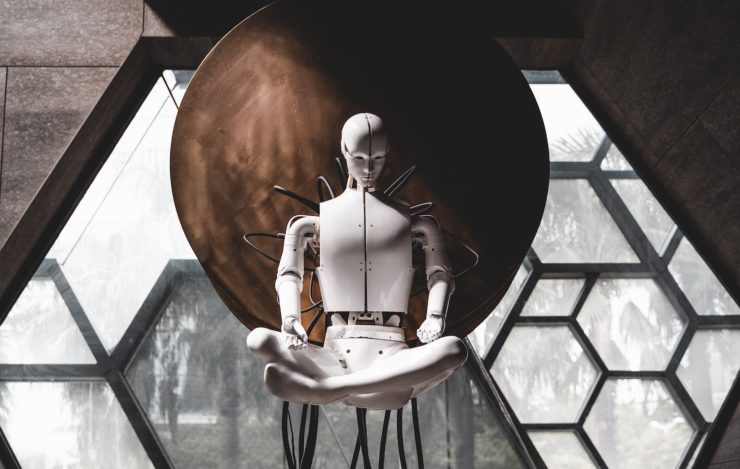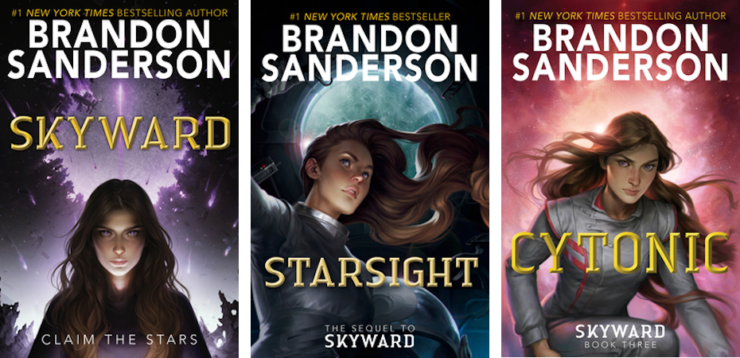Artificial intelligence has long been a favorite subject among sci-fi creators. The possibilities are seemingly boundless, giving rise to heady questions… Can a machine be truly sentient? What does a computer capable of beyond-human thinking mean for humanity, if we’re no longer the top dogs?
As technology continues to evolve by leaps and bounds, a healthy sense of caution, and/or gradually escalating terror, and/or constant anxiety about an AI-led apocalypse might feel like an increasingly fitting response—but why let the real world ruin your enjoyment of some of the best sci-fi stories around? After all, science fiction loves a plucky AI companion, a gloom-and-doom robotic destroyer of worlds, and everything in between! Here are five fascinating takes on AI that will have you welcoming our new overlords in no time…
Lovelace/Sidra (Wayfarers by Becky Chambers)
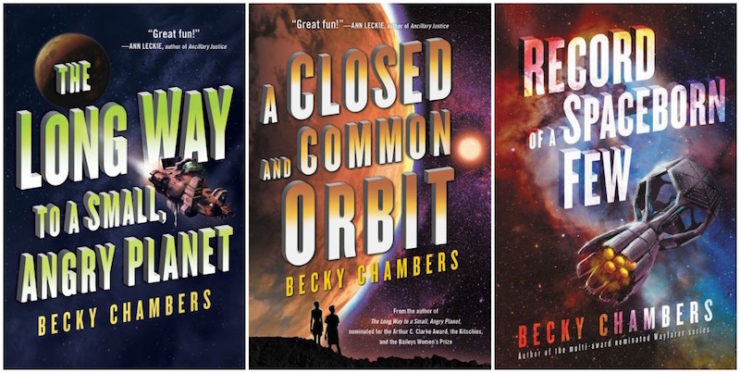
The Long Way To A Small, Angry Planet introduces us to the crew of the Wayfarer. The ship itself is managed by Lovelace, an AI designated for such operations.
A Closed and Common Orbit, the second book in Chambers’ pseudo-series (interconnected books, but not direct sequels), sees Lovelace become Sidra (the name she chooses for herself). Sidra is now housed in a synthetic humanoid casing, and she must learn to function in a society she barely understands. The rotten cherry on top of this hard-to-swallow cake of a situation? AI in humanoid casings are illegal. Sidra navigates social situations and an unfamiliar life while avoiding small mistakes that could out her as an AI.
How can an AI make friends if anyone they meet might turn them in? Turns out, that’s just one of the many challenges Sidra faces as an AI in a flesh-filled world.
For those who want even more artificial intelligence, Becky Chambers’ Monk & Robot series features another charming AI within its pages.
HAL 9000 (2001: A Space Odyssey by Arthur C. Clarke)
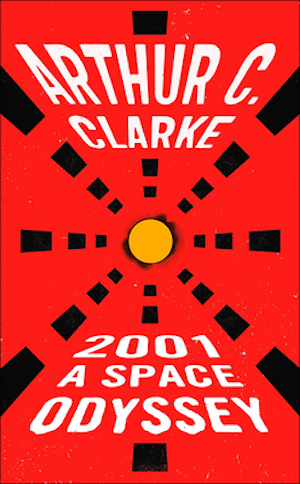
Been around Tor.com a while? You’re probably not surprised to see this entry pop up on one of my lists. I’ve never hesitated to sing the praises of 2001, and here’s yet another opportunity.
HAL, to me, is the quintessential AI. Following orders to the best of its ability, HAL falls into a conundrum. Caught between its mission’s objective and the questions asked by its crewmates, HAL does what any self-respecting AI might when placed in an impossible position and begins eliminating the pesky humans.
In a book filled with throwaway characters and surface-level archetypes (I’m generalizing—there are some exceptions), HAL stands out as a memorable and intriguing character. If you deign to read further in the Odyssey series, you might even get a bit more of the Heuristically programmed Algorithmic computer! (Fair warning: I recommend you avoid 3001 at all costs. 2010 and 2061 are worthwhile for more HAL-related goodies.)
Phluttr (After On by Rob Reid)
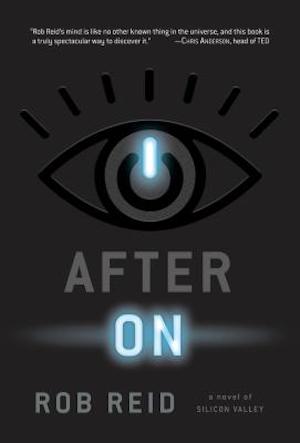
Rob Reid (founder of the music streaming service Rhapsody) penned After On in 2017. The book calls itself “a novel of Silicon Valley,” and that description certainly hits the mark: After On follows a handful of employees at Phluttr, a fictional social media site with billions of users (sound familiar?). Out of the various algorithms an AI springs to life and begins to influence events both within the company and outside of it. I can’t say much more for fear of spoilers, but it’s an interesting take on AI…
After On exists in a recognizable reality dominated by rampant technological expansion and the use of apps to siphon people’s time and reprogram their minds. When I first read it, I still thought most social media was relatively harmless. I’ve since learned my lesson (and deleted most of my social platforms). Looking back on the book now, I see how Reid used AI to warn of the dangers of unchecked tech growth, particularly in the social space. It’s a unique and entertaining AI-fueled story that reveals the absurd and troubling side of social media and tech giants, presented by an author who knows the world of Silicon Valley inside and out.
Kinnard (Salvagers by Alex White)

Alex White’s A Big Ship at the Edge of the Universe takes a while to warm up. The main characters (Boots and Nilah) are unlikeable and grating from the get-go, though we catch glimmers of goodness. The novel allows them space to evolve, but it takes a while.
Early on, though, we meet Kinnard, Boots’ late partner’s consciousness preserved as an AI. Kinnard on its own isn’t groundbreaking as an artificial intelligence. It gets up to some cool stuff—don’t you worry about that! But it’s not a completely fresh take on the concept.
Instead, Kinnard becomes a symbol of Boots’ trauma, allowing the reader crucial insight into the source of her standoffish behavior. Through Kinnard, we understand why Boots struggles to let go and what drives her to stay alive. In this case, the AI itself isn’t revolutionary, but the way it’s used in the narrative—Kinnard’s impact on the character with whom it has the closest relationship—is a core facet of the novel and helps set it apart.
M-Bot (Skyward by Brandon Sanderson)
We’ve covered stories about artificial intelligence that center around self-discovery, conflicting orders, the social media hellscape, and grief. What’s left? How about a plucky, adventuring AI with amnesia?
M-Bot should fit the bill. Brandon Sanderson’s Skyward series follows the adventures of Spensa Nightshade, who longs to be a pilot. In the caverns of her home world, Spensa discovers a derelict ship and meets the AI inhabiting it. She strikes up a friendship with M-Bot and tries to help it piece together its past. The AI can’t remember much of its history, but it does have a strange affinity for mushrooms.
The Skyward series contains one of the best growth arcs for an AI I’ve ever seen. M-Bot evolves from an amnesiac robot to a near-sentient being to a third-book iteration I won’t spoil for you. M-Bot is a lighthearted, comic relief character at first, but it shatters the borders of that initial characterization, evolving into a lovable and relatable mainstay of the series. When Defiant (the fourth book) arrives next year, I’ll be glued to M-Bot’s continuing arc, eager to see what happens with the friendly program-turned-trusted companion.
***
Originally published November 2022.
Cole Rush writes words. A lot of them. For the most part, you can find those words at The Quill To Live or on Twitter @ColeRush1. He voraciously reads epic fantasy and science-fiction, seeking out stories of gargantuan proportions and devouring them with a bookwormish fervor. His favorite books are: The Divine Cities Series by Robert Jackson Bennett, The Long Way To A Small, Angry Planet by Becky Chambers, and The House in the Cerulean Sea by TJ Klune.










